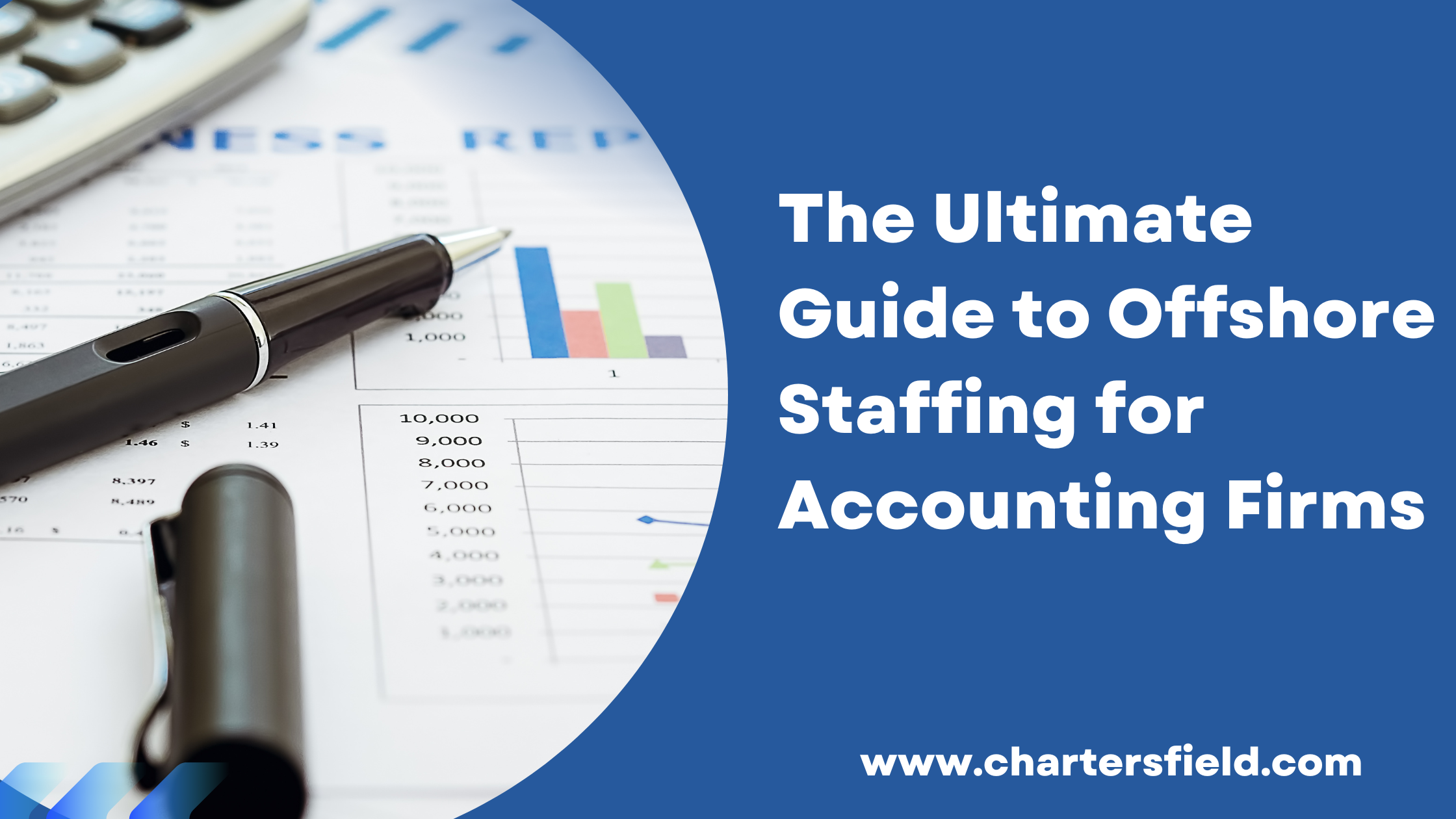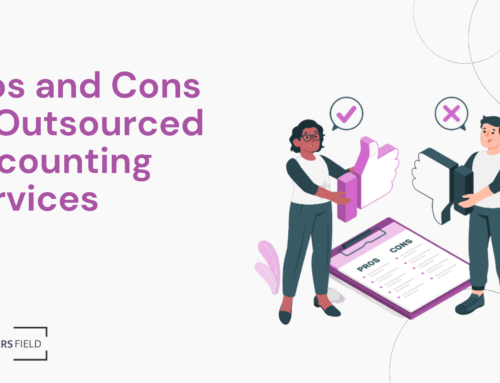Financial and accounting services represent the backbone of any successful business. Therefore, it is imperative for accounting firms and their personnel to execute their responsibilities with precision and commitment. Recognizing the critical nature of accounting tasks, several CPA firms across the United States are embracing innovative hiring approaches, such as offshore staffing solutions for accounting firms.
Understanding Offshore Staffing vs. Outsourcing
Defining Offshore Staffing
Offshore staffing and outsourcing are distinct employment models. Offshoring involves relocating business operations to another country to capitalize on enhanced growth and productivity opportunities. Conversely, outsourcing entails contracting specific tasks to an external global entity.
In the realm of accounting, offshore staffing for accounting firms involves partnering with specialized accounting companies like Chartersfield, which offer tailored solutions to businesses of varying sizes. These accounting firms can delegate specific tasks or even entire departments to offshore teams.
Addressing the Accountant Shortage in the USA
The United States Bureau of Labor Statistics (BLS) projects an annual creation of 136,400 job openings for accountants and auditors over the next decade. This impending shortage could intensify competition for top talent, with potentially far-reaching consequences for business integrity and compliance.
Impact of Accountant Shortage on Businesses
- Delayed Financial Reporting: Businesses might encounter challenges in securing qualified accountants for timely financial reporting, leading to reporting delays that impede loan procurement and strategic decision-making.
- Heightened Compliance Risks: A dearth of qualified accountants could hinder businesses from adhering to regulatory standards, inviting penalties and regulatory scrutiny.
- Increased Fraud Vulnerability: The shortage of accountants may facilitate fraudulent activities within businesses due to inadequate detection and investigation capabilities.
- Stock Price Volatility: Minor accounting discrepancies could trigger stock price fluctuations, eroding investor confidence and destabilizing market perception of a company’s financial stability.
Must read… Unlocking Efficiency: Why Outsourcing Payroll Services is a Game-Changer
In light of these challenges, offshore staffing emerges as a strategic solution for accounting firms striving to meet rising demand amidst a talent shortage. By leveraging offshore resources, businesses can optimise efficiency, maintain compliance, and sustain financial integrity in a dynamic economic landscape.
Benefits of Offshore Staffing for US Accounting Firms
In the fiercely competitive landscape of the accounting industry, maximising profits quickly is crucial for new CPA firms aiming for growth and expansion. Offshore staffing emerges as a highly effective solution to achieve these goals.
1. Client Retention and Service Availability
Offshore staffing provides access to a dedicated, qualified offshore team, significantly enhancing your firm’s ability to handle bookkeeping and accounting tasks. With teams operating in different time zones like India and the US, firms can offer around-the-clock services, ensuring prompt response to client needs and inquiries. This reliability boosts client satisfaction and strengthens the firm’s reputation, ultimately driving profitability.
2. Mitigation of Employee Turnover
Employee retention is a significant challenge in the accounting industry. Offshore accounting teams offer continuity and stability to your operations. In the event of an unexpected staff departure, offshore partners can seamlessly provide necessary support and services, eliminating disruptions and costly hiring processes.
3. Enhanced Quality Assurance
Professional offshore teams undergo stringent quality checks, minimizing errors and ensuring accuracy in accounting processes. By entrusting tasks to reliable offshore providers, firms can maintain high standards of service and operational efficiency.
4. Expanded Service Offerings
Offshore staffing enables accounting firms to diversify their service offerings without the limitations of internal resources. Whether it’s tax preparation during peak seasons or additional financial services, offshore teams provide the expertise needed to meet client demands effectively.
5. Flexible Resource Allocation
Businesses experience fluctuating workloads based on seasonal cycles or specific business demands. Offshore staffing allows firms to scale their workforce according to workload fluctuations without the overhead of hiring additional in-house staff. This flexibility optimises resource allocation and operational efficiency.
6. Increased Profitability and Cost Savings
Offshore staffing reduces overhead costs associated with in-house hiring, such as part-time wages and departmental expenses. By streamlining operations and minimizing expenses, accounting firms can focus on revenue-generating activities and strategic business development, ultimately boosting profitability.
Offshore staffing presents a multitude of benefits beyond cost efficiency for US accounting firms. From ensuring client satisfaction to optimizing operational productivity and profitability, offshore partnerships empower firms to thrive in a competitive industry landscape. By leveraging offshore resources strategically, accounting firms can navigate challenges effectively and position themselves for sustainable growth.
Considerations for Choosing an Offshore Staffing Partner for Accounting Firms
Selecting the right offshore staffing partner is a critical decision for accounting firms looking to optimize their operations. Here are key factors to consider:
1. Cost
Offshore staffing offers cost-effective access to specialised skills, but it’s essential to compare costs with hiring in-house staff. Consider expenses like training, communication tools, and management oversight.
2. Quality of Service
Ensure the offshore provider has a proven track record of delivering high-quality work. Check references and review samples to assess the level of service you can expect.
3. Flexibility
Choose a partner capable of scaling the workforce according to your needs. Flexibility is key in adapting to changing workloads and requirements.
4. Reliability
Partner with a reliable and responsive offshore provider. They should be accessible when needed and consistently deliver on their commitments.
5. Security
Data security is paramount. Ensure the offshore provider has robust security measures in place, including secure infrastructure and adherence to data protection best practices.
6. Time Zone Compatibility
Consider time zone differences to ensure effective communication and timely delivery of services. Choose a provider that aligns with your working hours.
7. Language Barrier
Ensure effective communication by selecting a provider with language proficiency or access to translation services if needed.
8. Cultural Sensitivity
Be mindful of cultural differences to prevent misunderstandings. Respect and understand cultural norms of the offshore provider’s country.
9. Legal Compliance
Ensure outsourcing complies with all relevant laws and regulations. Consult legal experts to mitigate legal implications associated with offshore staffing.
Conclusion
In conclusion, offshore staffing presents a compelling opportunity for accounting firms to optimise their operations and achieve strategic objectives. By embracing offshore staffing models, firms can access specialised talent, enhance cost-efficiency, and improve scalability. Offshore teams offer flexibility in adapting to fluctuating workloads and seasonal demands, allowing firms to maintain agility and responsiveness in a dynamic business environment. Moreover, offshore staffing promotes innovation by leveraging advanced technologies and diverse skill sets, enabling firms to deliver higher-quality services and expand their service offerings.
In today’s competitive landscape, offshore staffing is not merely a cost-saving measure but a strategic enabler of growth and efficiency. By harnessing the benefits of offshore



